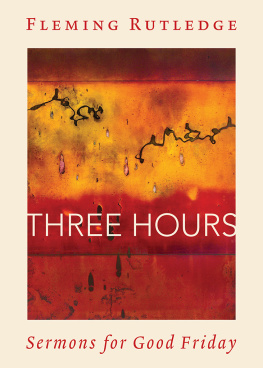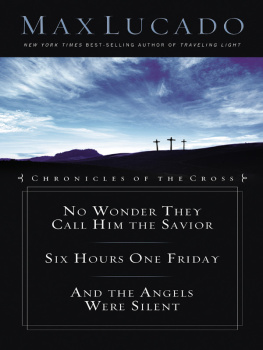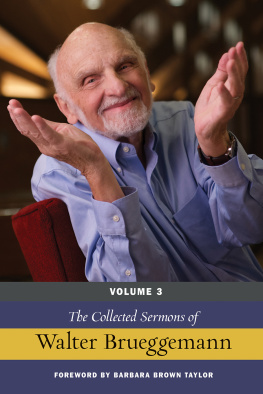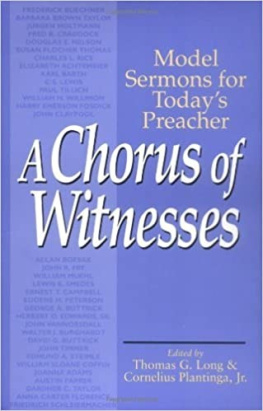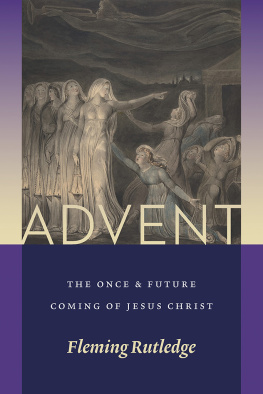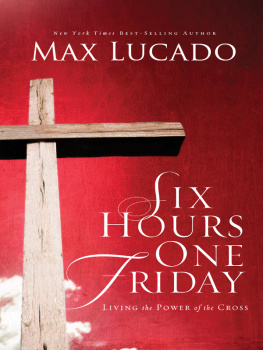THREE HOURS
Sermons for Good Friday
Fleming Rutledge
WILLIAM B. EERDMANS PUBLISHING COMPANY
GRAND RAPIDS, MICHIGAN
Wm. B. Eerdmans Publishing Co.
4035 Park East Court SE, Grand Rapids, Michigan 49546
www.eerdmans.com
2019 Fleming Rutledge
All rights reserved
Published 2019
2827262524232221201912345678910
ISBN978-0-8028-7719-2
eISBN978-1-4674-5266-3
Library of Congress Cataloging-in-Publication Data
A catalog record for this book is available from the Library of Congress
The author and publisher gratefully acknowledge permission to reprint Joy Williams, Wet, in Ninety-nine Stories of God. Copyright 2016 by Joy Williams. Reprinted by permission of ICM Partners and Tin House Books.
In memory of my master teacher
Paul Louis Lehmann
Crux probat omnia
AUTHORS NOTE
S t. Thomas Fifth Avenue in New York City is one of very few Episcopal churches remaining in the United States that still offers a full three hours of preaching, interspersed with music and prayers, for the noon-to-three service of worship on Good Friday. It was a great honor to be invited to give these sermons on that day in 2018. They are reproduced here almost exactly as they were preached.
For me, this occasion felt like a culmination of all my preaching over the past forty-five years. I would like to think that there are many potential readers who will find these offerings helpful as they seek to understand more fully the nature of the sacrifice that God himself made in the person of his Son on Good Friday in Jerusalem two millennia ago. My earlier book, The Crucifixion: Understanding the Death of Jesus Christ, expounds this theme at length. I hope that this slim volume might encourage readers to further pursue the depths of the Scriptures concerning what Paul the Apostle called the heart of the Christian gospel: Jesus Christ and him crucified.
If you would like to hear the sermons as originally preached, the webcast may be found at http://www.saintthomaschurch.org/calendar/events/worship/21936/the-three-hours-devotion#webcast. My thanks to Avery Griffin, Website Manager and Audio Engineer at Saint Thomas Church Fifth Avenue, for his work in making this webcast available.
For the most part, I have preferred to use the Revised Standard Version translation of the Bible, although in two or three places I have used an alternate English translation of a word in order to emphasize what I take to be the meaning of the original Greek. The RSV remains my standard because, while it modernizes the King James Version and corrects its mistakes, it preserves much of the KJV cadence that made that translation so uniquely powerful and memorable. I have used the KJV itself in the translations at the head of the chapters.
FIRST SERMON
And there were also two others, malefactors, led with him to be put to death. And when they were come to the place, which is called Calvary, there they crucified him, and the malefactors, one on the right hand, and the other on the left. Then said Jesus, Father, forgive them; for they know not what they do. And they parted his raiment, and cast lots.
Luke 23:3234
Or was he forgiving Caiaphas the high priest and his kangaroo court? Pontius Pilate, who washed his hands of him? Peter, who denied him three times? In any case, this saying sets forgiveness at the heart and center of Lukes passion narrative. But to what extent does Christian forgiveness extend to those who know exactly what they are doing? These are not easy questions.
I was struck by an article on the front page of the failing New York Times about six weeks ago. His name is Alaric Piette, a former Navy SEAL with only six years experience as a lawyer, and no experience at all with a case involving the death penalty. He agrees with his critics that he is unfit for his task, but it seems that the whole legal team resigned from the case, and he was the only lawyer willing to stay with it.
Lt. Piettes client is Abd al-Rahim al-Nashiri, a Saudi Arabian accused of planning the bombing of the US destroyer Cole in the year 2000. This is a person that almost any American would assume deserved conviction and a harsh penalty. The case is complicated, though, because he was tortured for four years in a CIA black site and remains profoundly traumatized. Heres what caught my attention in the article. During Lt. Piettes last year at the Georgetown Law School, he decided that he would not become a prosecutor as he had originally planned. He shifted his emphasis to criminal defense. Raised Roman Catholic, he found that representing destitute, often mentally ill clients enabled him to really understand the teachings of Jesus for the first time. He said, It was the first time since [I left] the SEALs [that] I found something really meaningful. I was standing between a person and the system. Many of the members of the team that left the case expressed extreme disdain for Lt. Piette, but one of his professors at Georgetown displayed his photo in her ethics class as an example of a courageous and ethical representation.... Hes pretty gutsy. This legal train is in motion and he steps out in front to protect his client. I dont know that all lawyers would do that.
Lets assume that the accused Saudi man is indeed guilty of plotting the terrorist act. Is he deserving of a defense? Does he have rights? Our system teaches us to presume innocence until proven guilty, but what are guilt and innocence, ultimately, in the sight of God?
A few days ago I had lunch with three clergy friends and we discussed this matter. One of them described a poster he had seen in a pacifist church not long after American Special Forces ambushed and killed Osama bin Laden. The poster had an illustration of Jesus greeting and embracing Osama bin Laden. All four of us agreed that this was offensive, but we agreed also that it sharply raised the question of exactly how far Christian forgiveness should go and who should
The book of Leviticus prescribes various religious sacrifices that should be made by people who have unwittingly broken the laws of God. Even if they knew not what they have done, they are judged guilty and must seek atonement. Significantly, there is no provision made in Leviticus for deliberate sin. Isnt that interesting? If you commit an unwitting offense, you have a remedy. But the person who commits sins with a high hand, as we read in the book of Numbers, has no remedy, but will be utterly cut off from the community, and his iniquity shall be upon him (Numbers 15:3031). Well get back to high-handed iniquity shortly, but for now well just note that the basic idea in the sacrificial rituals of Leviticus is the idea that atonement for sin costs something. Something valuable has to be offered in restitution. The life of the animal sacrifice, and a sense of awe at the shedding of blood, represents this payment. This is what the book of Hebrews in the New Testament means We are left, however, with the problem of the person who knows what he or she is doing.
I have often told a story about a man I knew in one of my former parishes. He was very well-educated and prominent in the community, but he was not at all self-important. I had no idea that he had been in the fabled Tenth Mountain Division during World War II, and I certainly didnt know that he had received the Silver Star until I went to a veterans gathering and someone told me. I started oohing and aahing to the veteran about his Silver Star, but he cut me off. He said, crisply and definitively, Nobody knows who deserves what. The more I have thought about that over the last twenty years, the more true it seems to me to be. An act of great courage performed by one person might be humanly impossible for another person with a different psychological makeup. Only God knows who deserves what.

